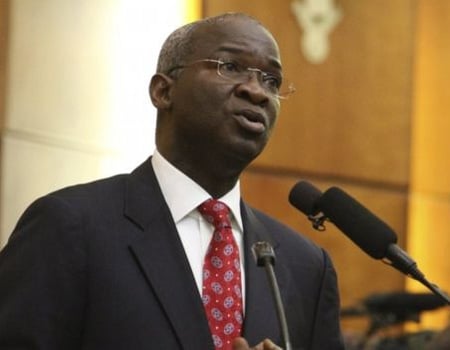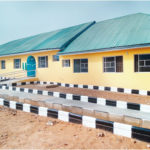The ongoing housing project in the Federal Capital Territory (FCT), is one of the national housing projects embarked upon in 33 states across the country.
Located at Dukpai area of Gwagwalada Area Council of the Federal Capital Territory, the project, which covers an area of about four hectares, consists of two components one of which is made up of buildings of three condominiums of three floors each with each condominium having four one-bedroom flats, 16 2-bedroom flats and four 3-bedroom flats totaling 24 flats and 72 flats for the three condominiums.
The second component, according to a project brief signed by the Project Team Leader, Mr Fashoranti Toyin, an architect, consists of infrastructure such as roads, electricity and motorized bore-hole.
The brief also showed that three contractors, Messrs City International Limited, Sonjay International, and Malami Pawa and Sons Limited are handling the building component of the contract while Messrs Sassads Trading and Construction Co. Limited, Umka Nigeria Limited and Muhsin Limited are handling the Infrastructure component.
Justifying the supposed huge budget allotted to his ministry, Fashola said: “Again, let me repeat; when you hear that the Ministry of Power, Works and Housing has the largest budget, this is what happens to the budget. We are just a conduit for moving it on to the people of Nigeria through contracts that are awarded, works that are done, payment that are made, concrete that is mixed, wood work that is done by carpenters, iron rods that are bound together by labourers; so that is what happens to that budget. This is the destination of the budget,” he said.
Speaking on the impact of the projects on the national economy, Fashola said the proof of the impact of the policy on the populace was no longer a matter of conjecture but could be seen and experienced by the people working at the various project sites.
Reiterating that the programme is currently on-going in 33 states of the country, the minister stated that: “This is the full ecosystem of the national economy that we are beginning to get back to.
“For example, there are 30 labourers currently working at the site, made up of carriers and masons; there are also 10 carpenters and 10 iron benders, as well as five plumbers and six electricians and many others who come daily to the site to do businesses like supply of food and other needs of the workers. This is a chain of economic benefits that should be applauded,” he declared.
The minister announced that a contractor, who also interacted with him at the site, told him that he has about 95 workers doing different jobs at the site adding that with government paying them regularly, they have no challenges hindering their work.
He was of the view that actual beneficiaries of the much touted huge budgets allocated to the Ministry of Power, Works and Housing, were the workers carrying out various tasks at the project sites, suppliers of construction materials, food vendors and others, who, according to him, would then take the money to the markets where the traders would also take their shares.
He declared, “It is no longer what I say that matters; the truth is that the Buhari administration’s infrastructure renewal policy is really getting to where it should be getting.
On how the programme could be sustained in order to ensure continuous jobs and employment for artisans and other skilled and unskilled workers as well as business men, the Minister hinted that here is no going back on what he called “proof of concept”.
You would have seen in Oyo, Osun and Kwara last week where all our Directors went, the same thing is happening. We also have this thing going on in Kano and Kaduna where I was last week. In the last year, we stopped at sites in Gombe, Taraba and this is all over the country. But we need to prove that this concept works”.
“When we finish, what we want to establish now is to ensure that people accept this 24 apartment design in this part of the country and that they can pay for it. Then you will see more of this. You will, probably see ten, twenty going on at the same time. So that is when the Housing Economy really takes full bloom”, he said.
Fashola advised business men and women to be ready to supply the market with household accessories such as curtains, carpets, bedding and household furniture pointing out that when people buy houses they would need those items to equip the houses. “The tailors and foam makers must get ready as well because the new house owners will need bed sheets and mattresses”, the Minister said.







